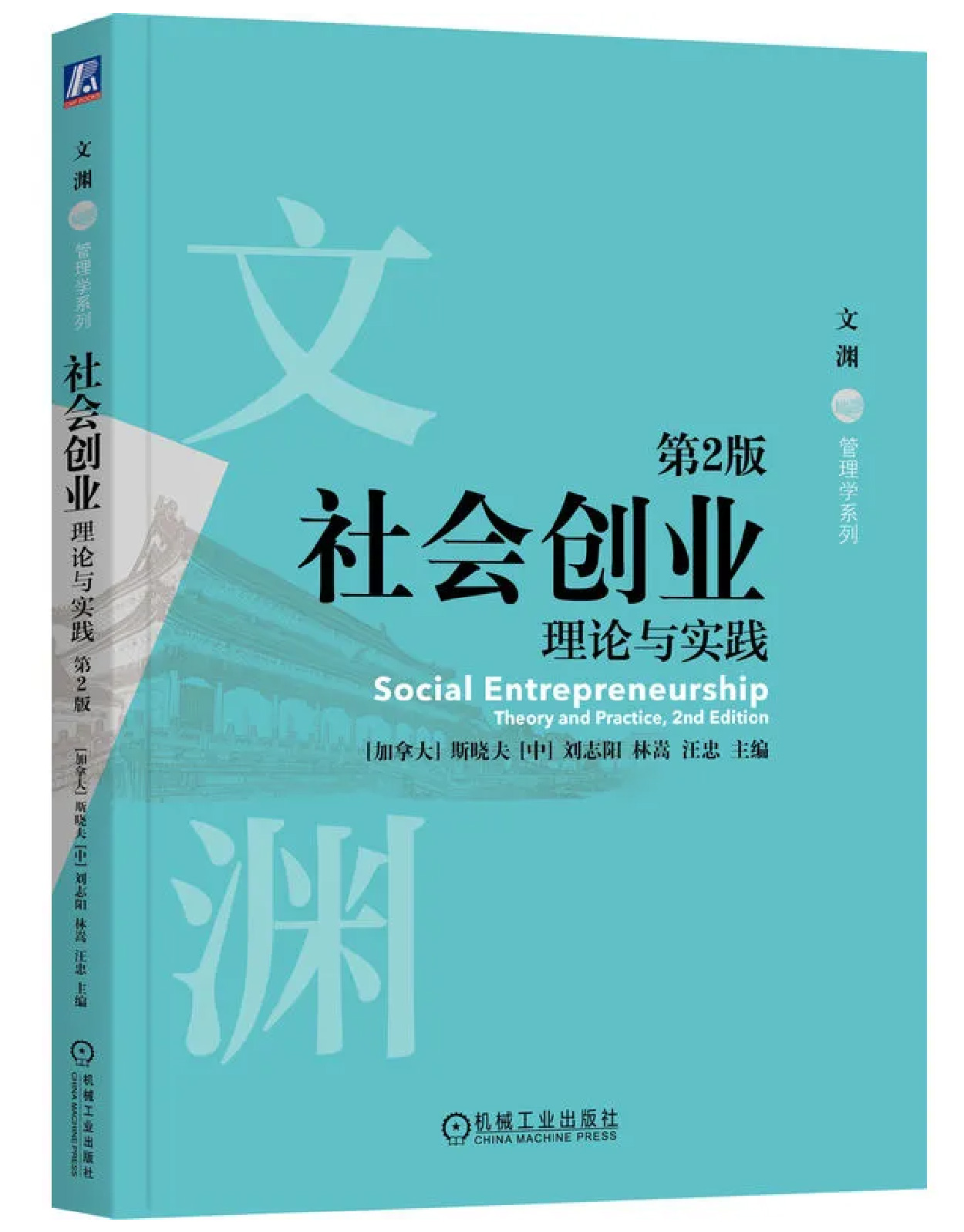Social entrepreneurship and economic entrepreneurship are two inseparable parts of entrepreneurship management, and both together promote economic development and social progress.
In recent years, social entrepreneurship has made some achievements in reducing poverty, promoting overall prosperity, social harmony, employment and rural revitalization in China, and it is expected to contribute more to solving major social contradictions.
It is important to analyze the latest theories of social entrepreneurship in conjunction with the Chinese context and find solutions to problems in the practice of social entrepreneurship.

In 2018, "Social Entrepreneurship: Theory and Practice", the first domestic textbook that systematically explains "social entrepreneurship", is published and compiled by SI Xiaofu, Director of the Entrepreneurship Research Institute of the School of Management at Zhejiang University.
Since then, six years have passed and the environment for social entrepreneurship has changed, some new phenomena and new models for social entrepreneurship have emerged in the course of China’s modernization.
In view of the changing boundaries of theory and practice at home and abroad, SI Xiaofu’s team officially launched the second edition of "Social Entrepreneurship: theory and practice" on July 13 this year.
This textbook has a total of 21 chapters, 7 of which are authored by Professors SI Xiaofu, WU Aiqi and WANG Song from Zhejiang University, as well as YAN Yushan, LIU Wan, CHEN Hui, etc.
|
SI Xiaofu | 斯晓夫 School of Management, Zhejiang University |
||
|
|
||
|
|
|
Academic Background: Qiushi Chair Professor and Doctoral Supervisor at Zhejiang University, Director of the Institute of Entrepreneurship Management at the School of Management, Zhejiang University. Research area: Entrepreneurship and innovation management, poverty alleviation through entrepreneurship, digital entrepreneurship, etc. |
|
WU Aiqi | 邬爱其 School of Management, Zhejiang University |
||
|
|
||
|
|
|
Academic Background: Qiushi Chair Professor and Doctoral Supervisor at Zhejiang University, Director of the Institute of Entrepreneurship Management, School of Management, Zhejiang University. Research area: Strategic Management, Entrepreneurial Management, Digital Economy. You can learn more about Prof. WU Aiqi’s academic background here |
|
WANG Song | 王颂 School of Management, Zhejiang University |
||
|
|
||
|
|
|
Academic Background: Associate Professor, Doctoral Supervisor, Department of Innovation, Entrepreneurship and Strategy, School of Management, Zhejiang University, Academic Director of MBA Entrepreneurship Management Program. Research area : Interpersonal interaction and human-machine collaboration in digital and intelligent organization scenarios. You can learn more about Prof. WANG Song’s academic background here |
|
Theoretical and Practical Research on "Social Entrepreneurship" in China |
The first edition of the textbook "Social Entrepreneurship: Theory and Practice" showcases many practical cases of social entrepreneurship and provides in-depth discussions of current theoretical issues in the field of social entrepreneurship.
The new version of the course has been improved and updated in several aspects to meet the needs of social entrepreneurship education and talent training in the new era. The course combines the advanced theories and practices of social entrepreneurship in China and abroad, and systematically explores new concepts and methods of social entrepreneurship based on the specific situation in China.
|
“ |
In this book, we can not only gradually understand how social entrepreneurs form their unique identity, how to build an efficient team, and how to integrate and utilize resources to recognize and seize new entrepreneurial opportunities. At the same time, you will also get a series of practical guidance on social enterprise business plan writing, organizational form, governance structure and performance evaluation.” |
It is worth mentioning that in addition to using rich and illustrative cases to introduce and guide the reader’s thinking in an easy-to-understand way, this book also has two highlights: one is the combination of top international theories with Chinese entrepreneurial practices, and the other is the exploration of issues centered on important national and social needs.
|
Introduce Theories in a Simple, Accessible Way to Stimulate Thinking |
More than 30 years ago, Yiwu was still considered a representative of the impoverished areas of Zhejiang province. To support their families, the farmers of Yiwu carried "peddler’s poles on their shoulders, shook rattles in their hands" and crossed mountains and rivers to trade chicken feathers for sugar.
Later, the "chicken feathers for sugar" hawker sticks were transformed into small commodity stalls and then gradually developed into small commodity markets. The farmers of Yiwu have escaped poverty and become rich through innovation and entrepreneurship.

|
Profile photo of Yiwu peddler exchanging chicken feathers for sugar (Photo source: Zhejiang Daily) |
How has Yiwu evolved from "trading chicken feathers for sugar" to a successful regional model of poverty alleviation? What lessons can we learn from entrepreneurial poverty alleviation in Yiwu?
|
|
|
|
"Yiwu’s Entrepreneurship Poverty Alleviation Practice" is one of the many practical cases in the textbook "Social Entrepreneurship: Theory and Practice" (2nd edition). By combining theory and practice, we can discover the development context of poverty alleviation through entrepreneurship in Yiwu and perhaps gain some ideas and reflections from it. |

|
2022 Winter Olympics braided bouquet (Photo source: CCTV News Client) |
From the "fading flower of the Winter Olympics" to the "waterdrop fundraising" platform for major diseases; from Yiwu’s entrepreneurial poverty alleviation model to Lishui’s practice of shared prosperity. Each chapter begins with a fascinating case. As the chapters progress, we will gain a deeper understanding of the theory and practice of social entrepreneurship.
|
The Combination of International Leadership Theories with the Chinese Practice of Social Entrepreneurship |
In recent years, social entrepreneurship has blossomed in countries around the world and has become an important means of promoting regional development, solving social problems and creating social value. So what changes and advances have there been in social entrepreneurship theory research from 2018 to 2024?
The second edition of the textbook "Social Entrepreneurship: Theory and Practice" further clarifies the theory of social entrepreneurship, provides more detailed and systematic explanations of the resources and opportunities of social entrepreneurship, and adds new chapters such as the identity of the social entrepreneur.

|
Image source: ©千库网 |
In this course, you can not only see a comparison of social entrepreneurship from an international perspective, but also follow the context of the article through local Chinese practical cases, combined with cutting-edge theories, to think deeply about the process of social entrepreneurship in China and possible problems.
Thus, this book uses specific cases to explain the role and mechanism of social entrepreneurship in rural revitalization and the various models of social entrepreneurship in rural areas in an easy-to-understand way.
For example, Chapter 13 of this book introduces the practice of shared prosperity in Lishui, Zhejiang province, as a case study and makes original explorations and reflections on the topic of shared prosperity. At the same time, under the background of the new era of social networks, Chapter 14 analyzes the mechanism of building social networks in social entrepreneurship and the application value of social networks in social entrepreneurship.

|
Wangcunkou Town, Suichang County, Lishui City, Zhejiang Province (Photo source: Xinhua News Agency) |
This book also conducts a systematic assessment of the social entrepreneurship process and influencing factors in the United States, the United Kingdom and other countries, and further explores and analyzes the reference and inspiration for social entrepreneurship activities in China.
The book not only compares the theory and practice research on social entrepreneurship in various countries from an international perspective, but also delves into local Chinese practice to effectively link cutting-edge theory with the Chinese context and provide solutions to the problems of social entrepreneurship in China.
|
Focus on National and Social Needs and Issues |
|
“ |
In recent years, China has achieved its poverty reduction goals as planned, shared prosperity is progressing steadily and the environment for social entrepreneurship has also changed profoundly. |
Rural areas hold valuable wealth and huge development potential. Rural revitalization is also a national strategy. It requires entrepreneurs and businessmen who are committed to rural construction to explore opportunities and realize the co-creation and utilization of various values such as economy, society and environmental ecology.

|
(Photo source: Zhejiang Online) |
The following questions therefore arise for social entrepreneurship that meets the most important needs of the country and society:
|
|
• What is the role of social entrepreneurship in rural revitalization? • What mechanisms enable social entrepreneurship to promote rural revitalization? • What are the models and characteristics of social entrepreneurship in rural areas? • What is meant by shared prosperity? • Why is it necessary to promote social entrepreneurship to create social prosperity? |
The new edition of the textbook specifically discusses the role of social entrepreneurship in rural revitalization and common prosperity, providing comprehensive and detailed answers to these questions.

|
Photo source: Xinhua News Agency |
Talking about the original intention of compiling the "Social Entrepreneurship" textbook series, SI Xiaofu said:
|
“ |
Social entrepreneurship can not only promote economic development, but also drive social progress, form China’s "social good" and social entrepreneurship spirit, while promoting the country’s goals of inclusion and sustainable development. I have been involved in entrepreneurship for many years. Since 2016, I have increasingly felt that entrepreneurship management in my country is essentially talking about economic or commercial entrepreneurship and largely ignoring the existence and value of social entrepreneurship. However, entrepreneurship can explore not only economic entrepreneurship, but also social entrepreneurship.” |
|
|
Social entrepreneurship and commercial entrepreneurship have different focuses, but they are inextricably linked and together promote the development of entrepreneurial theory and practice. Therefore, I consulted with Professor WU Xiaobo, the former dean of the School of Management at Zhejiang University. My ideas are in line with the idea of healthy power, which he strongly advocates. With his support and the support of Professors WEI Jiang, CHEN Ling, WU Aiqi and others from the School of Management, as the first editor, I began to organize domestic experts and outstanding scholars in the field of social entrepreneurship to write the first textbook "Social Entrepreneurship: Theory and Practice". The work on this book took two years. After the joint efforts of all those involved, it was published in 2018. It is the first systematic textbook on social entrepreneurship in China. Compared with the first edition, the new edition is more comprehensive. It not only includes content on major national and social issues such as rural revitalization, overall prosperity and scientific and technological development, but also adds some innovative theories, making the book more systematic. ” |
At the 2020 research meeting on "Entrepreneurship and Poverty Alleviation", SI Xiaofu also said:
|
“ |
Entrepreneurship research should first solve practical problems, and secondly, theoretical research should provide theoretical support for solving practical problems. Whether it is theoretical research or practical exploration, both economic development and building a better society should be considered." |
- We sincerely thank Prof. SI Xiaofu for his dedication and invaluable contributions to the field of social entrepreneurship. Thank you for your continuous efforts in advancing entrepreneurship education and making a meaningful impact on society, Prof. SI!
- You can read the original article in Chinese here